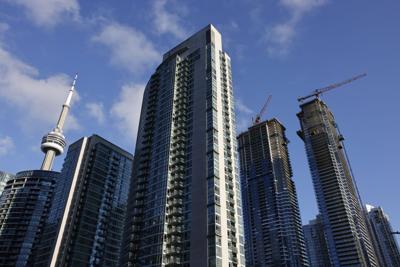For most of my adult life, people in É«É«Ŕ˛ have been waiting for the crash. Expecting it. Even hoping for it. Could it finally be happening?
Around the turn of the millennium, Xtreme Real Estate became this city’s favourite spectator sport. At every dinner party, you’d hear gasping gossip about how much some tiny fixer-upper had sold for. You’d cruise the MLS listings, mouth agape at the prices, as if that were a normal activity. And a house going for some absurd amount “over asking” was sure to make the news.
For many É«É«Ŕ˛nians, the real-estate market resembled disaster porn. It was like being in the stands at a Formula 1 race with fans holding their breath, waiting for the big wreck.
In 2003, É«É«Ŕ˛ Life published a breathless cover story on “surreal estate” — because back then, it seemed as if half a million dollars soon wouldn’t be enough to buy a decent family home near downtown. The big hook for that story was a five-bedroom detached house across from Withrow Park, in Riverdale, near what was then the most desirable primary school in the city, that sold for $725,500. They called it “a portrait of a market gone mad.”
Everyone thought: The fall must be coming, right? In 2008, Maclean’s covered what it called the “looming real estate crisis.” In 2010, É«É«Ŕ˛ Life asked: “We’re in a bubble, now what?” Three years later, Maclean’s declared that the housing apocalypse was upon us: “Crash and burn: the housing bubble has burst and few Canadians will emerge unscathed.”
For a long while, the people doing all this predicting were people who could still remember the 1989 crash that saw the average home in É«É«Ŕ˛ lose about 30 per cent of its value. I was a kid then, but there were adults in our family’s circle who lost everything they’d saved for all their lives in that crash and wound up underwater on mortgages they could no longer afford as interest rates went up. We weren’t alone, and for a long while after, there was broad mistrust of increasing housing prices.
But eventually, people came to expect prices to keep on climbing — . What could go wrong? In the mid-2010s, a mortgage adviser at the bank confidently told me that interest rates “historically” had “never gone up.” The market crash and credit-card-esque rates of the 1980s were suddenly prehistoric, beyond memory.
Our collective fear became not that a market downturn would crush the economy and bankrupt homeowners but that ever-escalating prices would prevent anyone new from being able to own a home. Many of us stopped fearing a crash and started praying for one instead.
So is it really here? Maybe. Gregor Robertson, the federal housing minister, recently said the É«É«Ŕ˛ condo market was in “free fall,” with sales having dropped 70 per cent year over year . And it’s not just condos. Prices for detached homes are down 10 per cent over the past year, and the average selling price across all home types is down 21 per cent from the 2022 market peak.
As May Warren reported in the Star this week, many folks are rejoicing. Cheering when a house sells for less than its previous sale price has become a popular online activity. You can understand the celebrations: those who’ve been left on the sidelines of the market so far are hoping against hope for a house to pop up at a price they can afford.
Yet we’re a long way from affordability. The average home still costs more than $1 million. has recently reported, a study by that compared housing costs to income levels found É«É«Ŕ˛ to be the third-least affordable city in North America (dramatically less affordable than such superstars as New York, Miami and Boston).
Many homeowners now selling at a loss got into the market around 2022 — after decades of scrimping and saving — only to be forced by rising interest rates to offload their property for peanuts and lose all that they’d saved. For them, the current situation is a disaster. And a broader market collapse could spell a broader disaster still, one capable of spurring (or deepening) an economy-wide recession.
Meanwhile, there’s a further bad-news side-effect to the apparent good news of less expensive condos, in particular: depressed prices could completely halt new construction. In a city with a real housing shortage, that’s another potential impediment to real affordability.
We seem to have reached a stage where, all at once, existing homeowners are losing money, houses are still unaffordable and our already-short supply may soon be limited further.
As Robertson said this week, government efforts are focused, as they should be, not on manipulating the market to shore up prices and supply but on increasing the amount of non-market affordable housing available. There’s some hope that more developers will turn to rental units. Industry insiders say a market correction could result in builders building the kinds of homes people actually want to live in rather than only the kinds investors want to speculate on. So perhaps we’ll have a legitimate reason to cheer someday.
For now, after decades of confidently (yet mistakenly) predicted downturns, it seems the downturn has indeed arrived. But I wouldn’t dare predict what might happen next.
Error! Sorry, there was an error processing your request.
There was a problem with the recaptcha. Please try again.
You may unsubscribe at any time. By signing up, you agree to our and . This site is protected by reCAPTCHA and the Google and apply.
Want more of the latest from us? Sign up for more at our newsletter page.



















To join the conversation set a first and last name in your user profile.
Sign in or register for free to join the Conversation